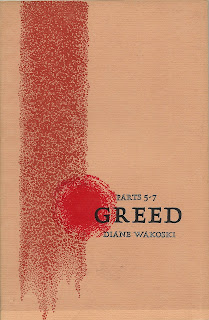these same people
produce beautiful objects
benevolent institutions
or write books and religions.
But, usually, it doesn't. In this deeply confessional book she tells us she gave up her own children, in part because she was poor and had no husband and in part to pursue her poetry. She says we would understand if we gave up our sentimentality. And she likens our greed to sharks, at one point listing their beautiful names: "when I start listing beautiful names / it is because my own pain is so deep."
As this has been quite the summer of shark headlines, shark attacks, injuries, terrible wounds, I know I am reading it at the right time. Also, though yesterday's book by Shane McCrae, seemed right for a Sunday, it's fine to be immersed in one of the seven deadly sins instead. Also, like McCrae's book, Wakoski's is part of a larger, ongoing project, with other books devoted to (other parts of) greed.
Part 6, about Jealousy, adds leeches to the water creatures in the book. It is so confessional, she writes it mainly as a "Dear Diary" entry, and it explains "how goodness, or the desire for it drives us mad." Also pertinent to Sunday, but irreverent to some, she says, "I am very melodramatic. I see myself hanging on a cross..." and confesses her petty jealousies, meanness, nastiness, and hypocrisy, mainly toward other poets when they get what she wanted. It's pretty shocking! Bracketed by Bill:
A good man is one who sees no cause for bitterness in this. Who does not find himself demeaned or hurt by such things. But what is it that protects him, keeps him whole, gives him transfusions of plasma to replace his evaportaing blood?
Perhaps faith in himself? A belief that art or love or anything valuable and beautiful is beyond the temporal?
Yes, I would guess that's it, and in Part 7, Self-Righteousness, she blames her mother for knocking her down, jealously, for any accomplishment, with the warning, "Pride goeth before a fall." And she brings the Lion Fish, a poisonous, spiky, threatening but "magnificent creature" into the already dangerous waters of life. Wakoski continues her astonishingly honest self-critique and rescues Pride in this section--distinguishing the deadly sin aspect from the pick-yourself-back-up-and-survive aspect. She knows she tried to be a good girl growing up, and how it hurt her:
Oh you false teacher,
letting me think if I were honest
and clean and straight,
the world would just be all right,
and that if it weren't I could sit righteously
in my chair of innocence and look back
at it
and somehow triumph.
But the world only admits it is wrong,
when you make it admit it is wrong;
and where is the poetry in that?
And have you ever felt like her in this?:
My angers come from having lived as I was taught
and not feeling the world honors or
rewards me for any of my decency.
But the Lion Fishy response of self-righteousness cannot be the answer [as bracketed by Bill]:
the greedy thought that when you are right
you can burn others for their wrongness;
it is a fire that could destroy
the world.
If you are fascinated by Diane Wakoski, you may enjoy the work of filmmaker Jesseca Ynez Simmons, interviewed here at Escape Into Life, and her film Emerald Ice, in which Wakoski appears, discussed here, with a teaser. And now I am going to try to be a better person.



1 comment:
I would just like to say that the guest pastor mentioned sharks in church this morning, making it a Random Coinciday in the blog!
Post a Comment